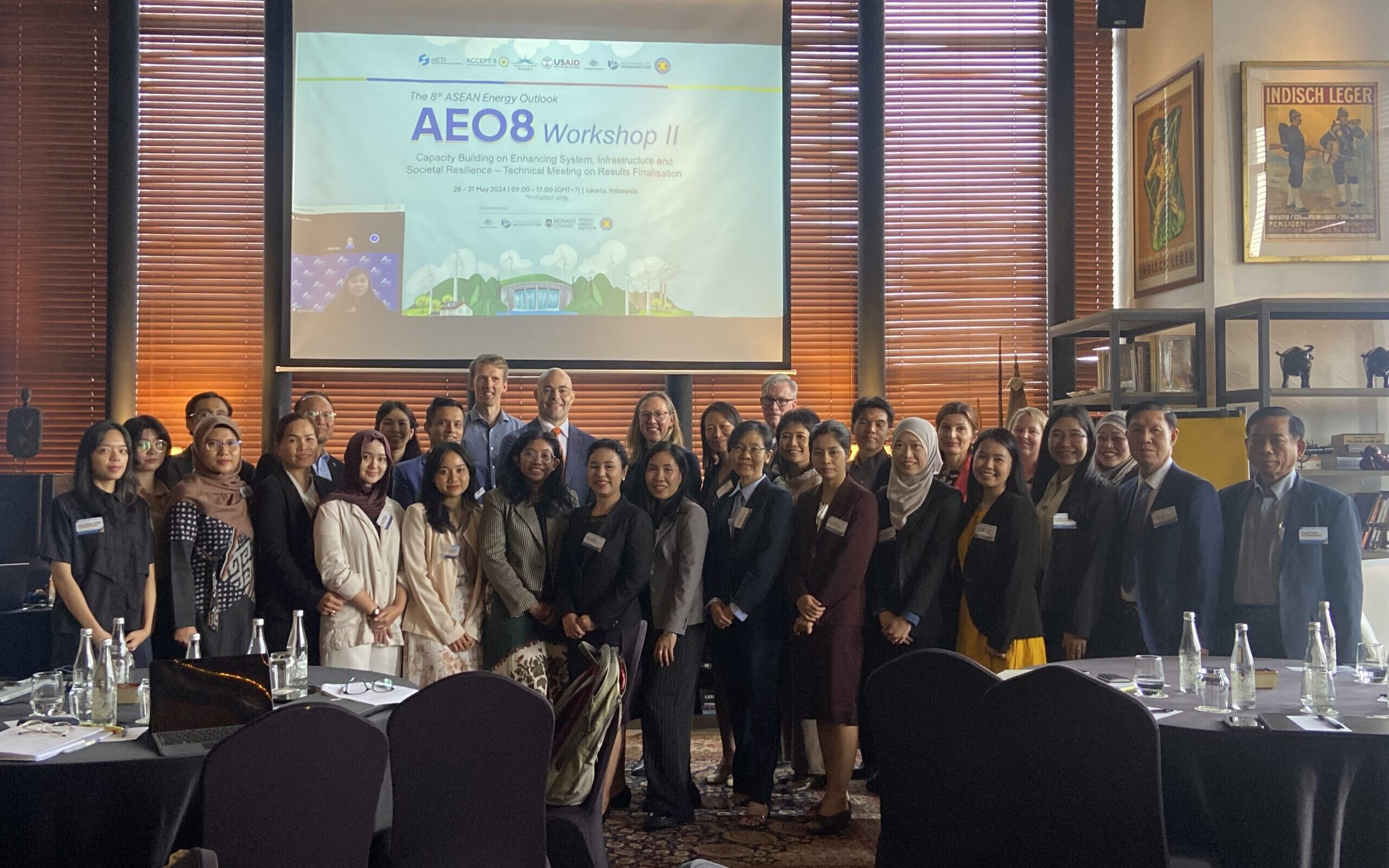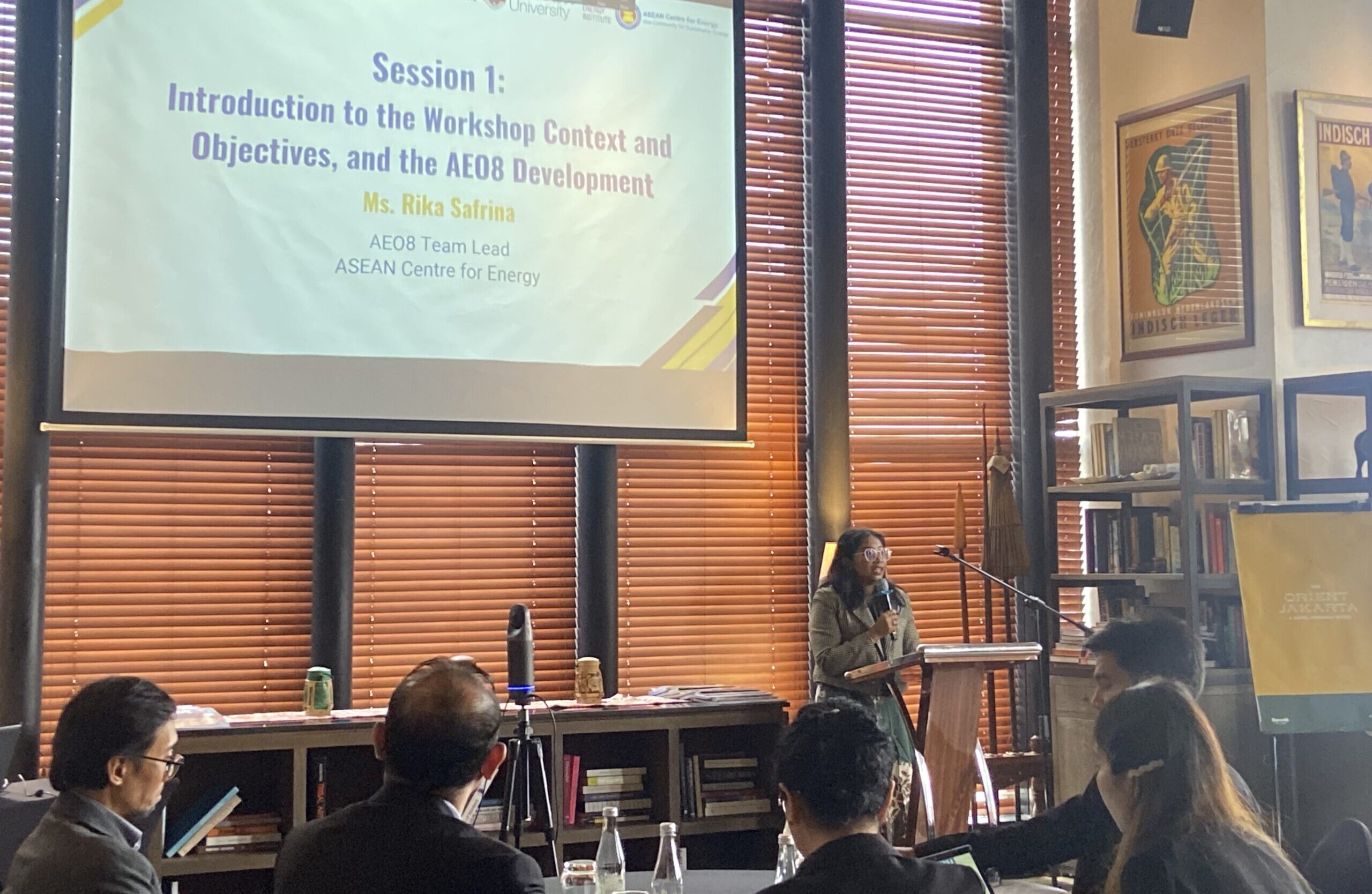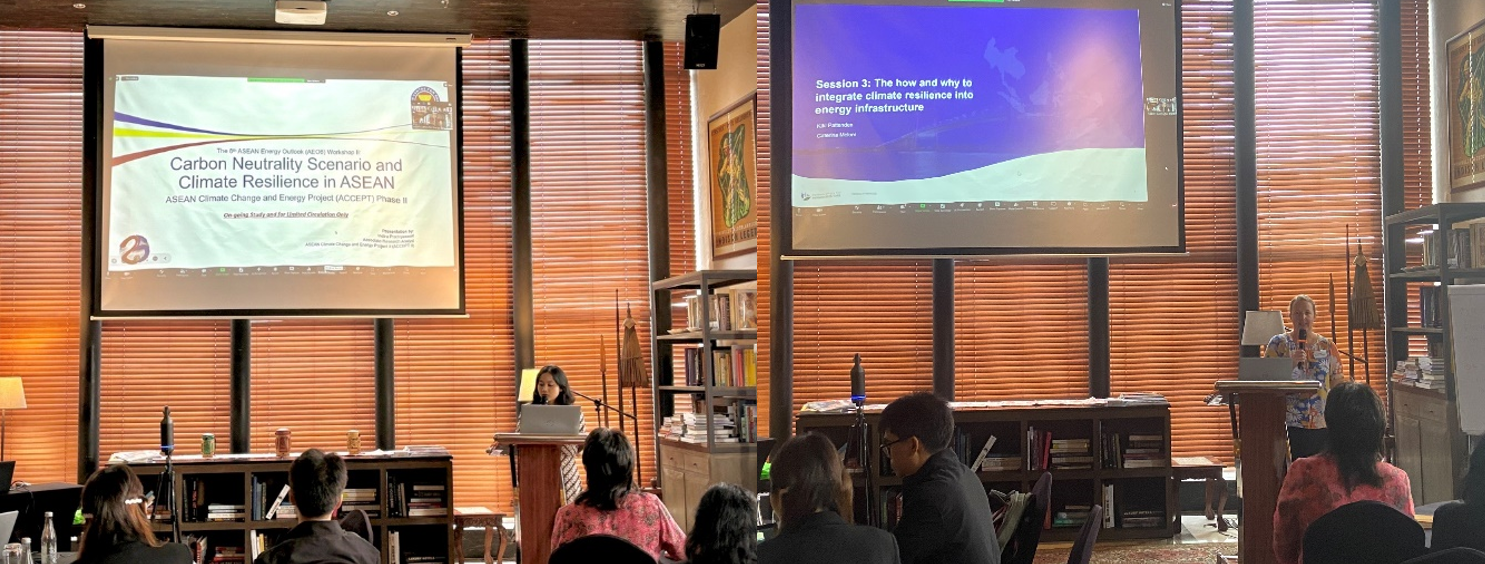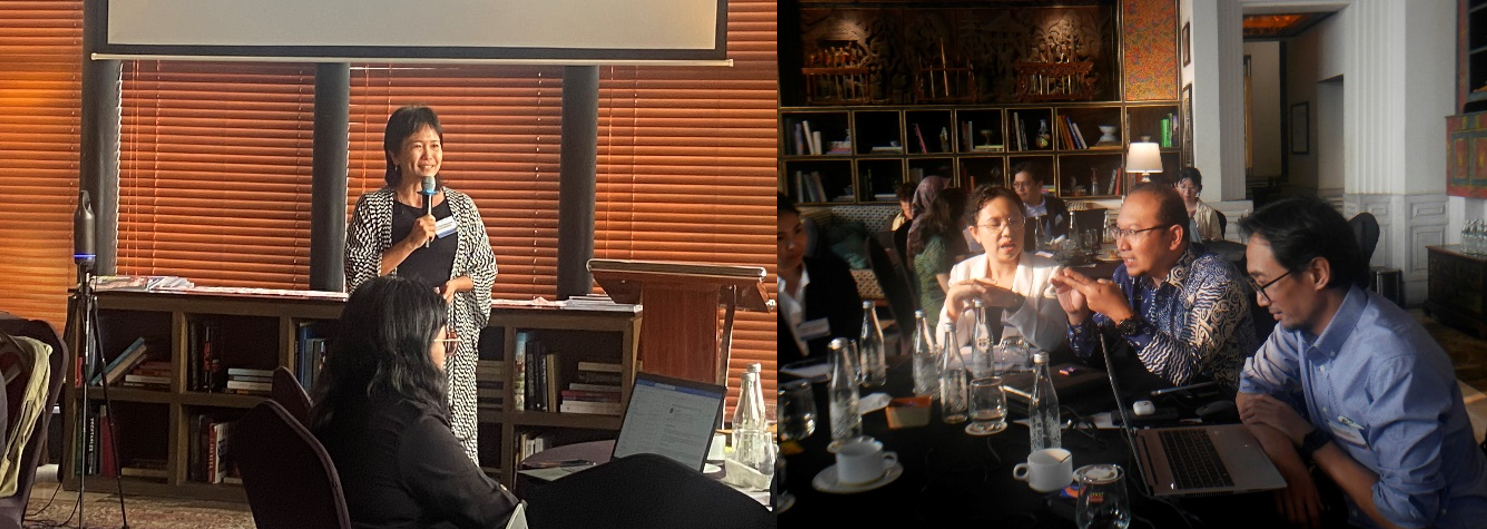Menu

Photo 1. ASEAN Member States‘ Representatives who attended the AEO8 Capacity Building Workshop
As the flagship publication of ACE, the ASEAN Energy Outlook (AEO8) complements and supplements the ASEAN Plan of Action for Energy Cooperation (APAEC), providing an overview of the current energy landscape and exploring pathways of the achievement of regional and national energy targets and beyond. The upcoming 8th ASEAN Energy Outlook (AEO8) will include a new scenario, Carbon Neutrality Scenario, and is targeted to be presented and launched at the 42nd ASEAN Ministers on Energy Meeting (AMEM) in Lao PDR in September 2024. To support the capacity building of AEO8, several workshops were done to enhance the capacity building of the proposed energy model.
The ASEAN Centre for Energy (ACE), supported by the Australian Government through the Partnerships for Infrastructure (P4I) and the Monash Energy Institute, organised the AEO8 Capacity Building Workshop in Jakarta, Indonesia. Held consecutively for three days from 28-30 May 2024, this workshop is a continuation of the previous AEO8 Workshop I held in Bogor, Indonesia, in November 2023, and is part of the AEO8 study to support the development of AEO8. Representatives from nine (9) ASEAN Member States (AMS) participated both in-person and online for the workshop, namely Brunei Darussalam, Cambodia, Indonesia, Lao PDR, Malaysia, Myanmar, the Philippines, Thailand, and Singapore.
This capacity building is aimed to increase understanding among AMS on the role of climate resilience in long-term planning and emerging issues in gender equality, energy storage and supply chain, electricity infrastructure resilience, and disaster risk reduction. Moreover, this capacity building intends to strengthen ACE’s team understanding, enabling a more comprehensive analysis in AEO8, especially regarding the new Carbon Neutrality Scenario (CNS). It also seeks to deepen knowledge of emerging themes and technologies to improve the resilience of energy systems, infrastructure, and society towards a just and equitable energy transition in the region.

Photo 2. (left-right) Opening Remarks delivered by Agnes Koh, Representative of Energy Market Authority Singapore as the Coordinator of Regional Energy Policy Planning Sub-Sector Network (REPP-SSN); Lara Franzen, Australian Mission to ASEAN, and Dr Nuki Agya Utama, Executive Director of ACE.
The workshop commenced with welcoming remarks from Agnes Koh, Representative of REPP-SSN Chair, who also serves as the Alternate SOE Leader of Singapore. During her speech, Agnes highlighted the importance of the AEO8 role in providing an in-depth analysis of the ASEAN’s energy landscape and a comprehensive roadmap for harmonising energy policies, fostering cooperation and advancing the adoption of low-carbon technology in the region.
Followed by the remarks from Lara Franzen, a representative from the Department of Foreign Affairs and Trade (DFAT) at the Australian Mission to ASEAN, who mentioned the ongoing cooperation between ASEAN and Australia and extended her appreciation of this knowledge-sharing opportunity on the adaptability and transportability of energy systems infrastructure, also societal resilience towards carbon neutrality.
Dr. Nuki Agya Utama, Executive Director of ACE, delivered his remarks. He sincerely wished the participants learned valuable lessons from this workshop and would further bridge stakeholders and policymakers to collaborate for a plain-sailing information transfer. Moreover, Dr. Nuki also stressed that ACE would continue to maintain the tagline “from ASEAN, by ASEAN, to ASEAN“ through AEO8, providing an up-to-date energy landscape, energy insights, and strategic policy recommendations to establish a feasible and transparent mechanism to obtain regional energy goals.
The workshop then proceeded to a keynote address delivered by Prof. Matthew Nicholson, President and Pro-Vice Chancellor, Monash University Indonesia, emphasising Monash University‘s dedication to providing a high-quality education worldwide and keen to develop a collective research capability throughout Southeast Asia.

Photo 3. Presentation by Rika Safrina, Senior Analyst of ACE
The first presentation, delivered by Rika Safrina, Senior Analyst of the Energy Modelling and Policy Planning (MPP) Department at ACE, introduced the workshop’s objectives along with AEO8‘s progress since the previous workshop in November. Dr. Roger Dargaville, Dr. Emi Gui, and Shreejan Pandey, from Monash University, explained the energy system resilience and addressed the ‘resilience thinking’ towards a just and equitable transition in ASEAN, encouraging each AMS to prepare facing uncertainty during the energy transition.
Kiki Patternden from Disaster Risk Reduction & Climate Change (DRRCC) Panel, Australia, explained the definition of climate resilience and its challenges, highlighting the need for AMS to improve their climate resilience with uncertainties in mind. The session also involved discussions to help AMS identify their uncertainties and find a way to address them. Sam Friggens, from the DRRCC Panel, delved more into climate resilience in the energy modelling and planning field, providing case studies from Australia on their energy systems resilience. After that, a discussion within AMS followed on how to address climate resilience in the energy planning in each respective country.

Photo 4. Presentation by Indira Pradnyaswari, Associate Research Analyst at ACE (left), Presentation by Kiki Patternden from DRRCC Panel (right)
The second day was opened by Dr. Emi Gui from Monash University, introducing the agenda‘s objectives and context to guide the whole day‘s discussion to give inputs on climate resilient modelling for AEO8. The introduction was then continued by Indira Pradnyaswari, Associate Research Analyst from the ASEAN Climate Change and Energy Project (ACCEPT) at ACE, who delivered a presentation on the AEO8 Carbon Neutrality Scenario and its relevancies to improve climate resilience in ASEAN.
Prof. David Whittle from Monash University held a session on mineral resources and supply chain management on clean energy transition, highlighting the role of critical minerals and their role in the energy transition.
This was followed by the presentation from Prof. Kuntala Lahiri-Hutt from the Australian National University, emphasising the gender-just transition in ASEAN’s energy landscape. Kiki Patternden, Sam Friggens, and Caterina Meloni from DRRCC Panel delivered a comprehensive presentation on integrating climate resilience into energy infrastructure, mentioning the importance of gender and social inclusion in building a climate resilience infrastructure.
The second day of the workshop was concluded with a presentation by Michael Williamson, Section Chief at UN ESCAP, who explained the regional coal phase-out initiatives, followed by a group discussion on the challenges and opportunities for a just and equitable transition away from coal for each AMS.

Photo 5. Presentation by Prof. Yuen Yoong Leung from the Sunway University (left), Discussion with AMS (right)
The third day of the workshop began with Dr. Emi Gui from Monash University, outlining the third day’s objective: dive deep into fossil fuel phase-out as a pathway towards carbon neutrality. This was followed by a virtual presentation by Dr. Ross Gawler from Monash University on the economic value of energy storage and its network value. Dr. Vigya Sharma from The University of Queensland attended virtually, delivering presentation on the social and economic dimension of fossil fuel phase-out and clean energy transition, highlighting the social consideration for a just energy transition. Mohammad Abu Zahra, Head of MENA Region at Global CCS Institute, presented the economics and application of Carbon Capture, Utilisation and Storage (CCUS) for Coal-Fired Power Generation. The session then proceeded into the topic of small nuclear reactors in the coal transition era with Henri Paillere, Head of Energy Planning & Economic Development at the International Atomic Energy Agency (IAEA), being held virtually, emphasising the contribution of nuclear power to achieve net zero in ASEAN.
Prof. Yuen Yoong Leung from Sunway University led the group reflection on carbon neutrality scenarios in Southeast Asia, including the regional cooperation potentials through a balance approach towards carbon neutrality.
Dr. Emi Gui wrapped up the three-day workshop by summarising the key message that explained throughout the workshop, emphasising on the need for climate resilience energy system adaption in the ASEAN region. Dr. Emi also highlighted the role of energy security, energy equity, and environmental sustainability in creating the energy system resilience. Lastly, Dr. Emi encourage each AMS to enhance their energy system resilience by analysing the interdependence between their social, physical, economic, and ecological systems, which further could be integrated into long-term planning strategies on carbon neutrality in their respective countries.
An ACE and AMS Working Group Technical Meeting on AEO8 was followed the next day, on 31 May 2024, which focused on presenting updates of AEO8 development, consulting with AMS on the initial results of AEO8 modelling works for all scenarios at the regional level, providing an understanding of how AMS data is processed and used in the AEO modelling, and discuss on how to interpret the modelling results effectively.
